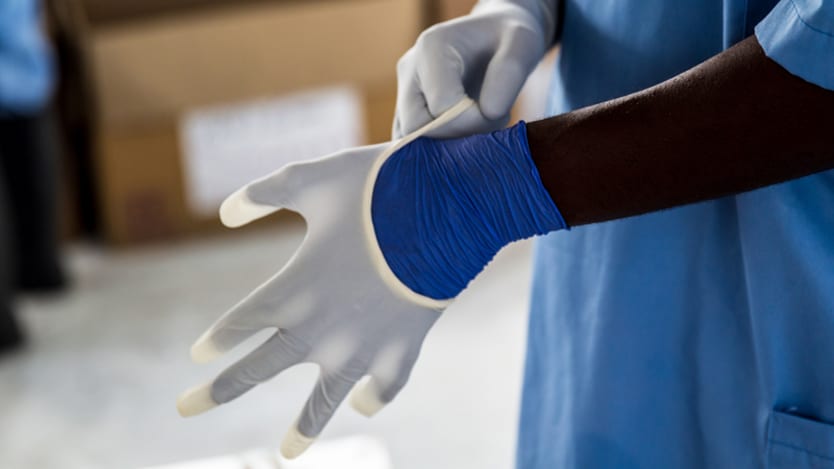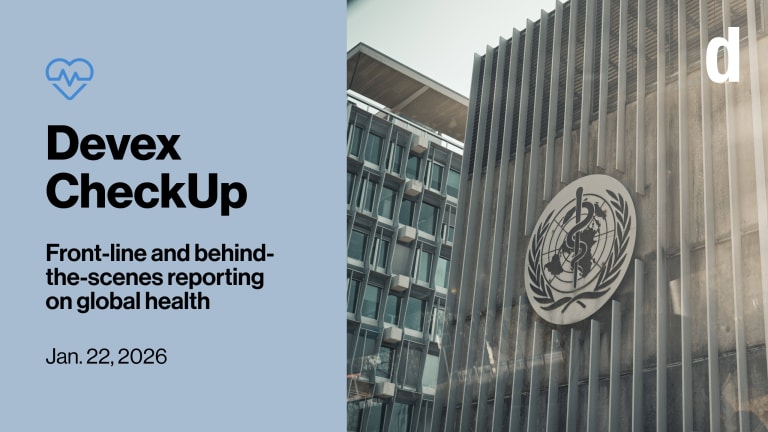CEPI, a year in: How can we get ready for the next pandemic?

DAVOS, Switzerland — Three sessions at the World Economic Forum’s annual meetings in Davos, Switzerland posed the question: “Are You Ready for the Next Pandemic?”
They were simulations demonstrating how ill-equipped countries are to respond to deadly threats such as Ebola, severe acute respiratory syndrome, and Zika. The news last month that the United States Center for Disease Control and Prevention will downsize its epidemic prevention activities has global health organizations sounding the alarm that funding cuts will leave the world unprepared for the next outbreak. But when the conversation at the World Economic Forum meetings turned to potential roadmaps for progress against pandemics, participants could take some comfort in the Coalition for Epidemic Preparedness Innovations, launched here at Davos in Jan. 2017.
CEPI brings together industry, governments, and philanthropy, to finance and coordinate the development of new vaccines in order to prevent and contain epidemics. It launched with initial investments from Norway, Japan, Germany, the Bill & Melinda Gates Foundation, and the Wellcome Trust. Since then Belgium, Australia, and Canada have announced additional financial commitments bringing the budget to $625 million out of a goal of $1 billion. In Davos, Devex spoke with some key stakeholders involved in its formation to get a sense of progress so far and what more is needed.
While simulations can paint a picture of just how devastating potential outbreaks can be, CEPI Chief Executive Officer Richard Hatchett also provided the crowd that gathered with real life anecdotes. He talked about the 2015 Middle East respiratory syndrome, or MERS, outbreak in South Korea. A citizen who traveled to Saudi Arabia then returned home and visited 3 hospitals, leading to 186 infections and 36 deaths, and $10 billion worth of damage to the South Korean economy.
“One of the things we’re doing in these simulations is underscoring how epidemics and pandemics are not just a health issue but an economic issue and a security issue,” he said. “It’s not just the once-a-century global pandemic we need to be concerned about. In this day and age, with the trade and transportation hubs that we have and the ease of movement globally, really even small epidemics present major threats to our people and to our economies and to our security.”
The problem that CEPI was set up to address is that there is no market for vaccines for epidemics, nothing driving industry to create these vaccines for diseases we cannot anticipate, and only a public-private partnership could address that market failure, Hatchett explained. At the end of last month, CEPI announced its new permanent board, moving into the next stage as an organization, so that vaccine developments can get underway. CEPI has built a solid foundation, and now the organization must focus on execution, Rajeev Venkayya, president of the Global Vaccine Business Unit at Takeda Pharmaceuticals and now a CEPI board member, told Devex.
“The highest priority should be to show progress in the vaccine and platform programs that CEPI is funding,” he said. “In addition to advancing preparedness for emerging infectious diseases, this will build confidence in the young enterprise and make the case for sustained support from an expanded base of funders in the future.”
CEPI will work over the next five years to develop vaccine candidates for three pathogens: Lassa fever, Nipah, and MERS. These were chosen by a scientific advisory committee based on a set of criteria including the risk of an outbreak occurring, the transmissibility of the pathogen, and the feasibility of developing vaccines, from the World Health Organization’s Blueprint for Action to Prevent Epidemics. For these diseases, CEPI will work with pharmaceutical companies to push promising candidates through trials so that if an outbreak occurs, they can test the candidates on humans, and push them out more quickly.
These are the threats the world knows about, where “just in case” vaccines are needed, but there is also a need for “just in time approaches,” supporting vaccine platforms that allow for rapid deployments of drugs when a new virus comes up.
“Zika was actually a threat that we had known about for 60 years, but nobody ever really understood the potential consequences particularly for pregnant women and their unborn children,” Hatchett said. “When we realized the threat that Zika posed and how rapidly it was spreading in the Western hemisphere, we were essentially starting from a cold start. It was almost like it was a brand new disease. And we have to have capabilities to respond rapidly when we are confronted with either a brand new disease or a disease that was just totally off of our radar screen like Zika.”
Not everyone agrees with CEPI’s chosen pathogens, noting for example that influenza is missing, despite warnings from the CDC about the risks of its potential to cause a pandemic. January marked not only the 48th anniversary of the World Economic Forum’s annual meetings, but also the 100th anniversary of the Spanish flu pandemic, which infected a third of the world’s population. But Peter Piot, a CEPI board member who helped to launch the alliance, emphasized the role CEPI plays in addressing a market failure, saying there is no point for CEPI to use public money if a private company can make a profit, and adding that influenza represents one disease where that is possible.
“What’s most important for me is strengthening capacity on the ground,” Piot said. “We can have a perfect global system, but it’s on the ground where action happens. It’s early detection, and that happens with local people. And I don’t see the money going there.”
Global health leaders say the news from the CDC demonstrates a concerning trend about the complacency that can set in after outbreaks like Ebola are contained. The programs the CDC will cut in 39 out of 49 countries work to stop outbreaks at their source by strengthening laboratory and emergency response systems and training frontline workers in outbreak detection. Given the speed at which pathogens can travel the planet, these rapid response systems are critical in countries with weak health systems, they say.
18 months in, how is WHO's health emergencies program working?
Despite the improvement in the speed the World Health Organization assesses public health events, and the implementation of a number of emergency-related tools, the emergencies program continues to face challenges — including delays in recruitment, lack of an integrated suply chain, and complacency in the absence of an Ebola-like outbreak.
The timeline for CEPI began in March 2014 in Guinea, West Africa, where the World Health Organization regional offices reported an outbreak of the Ebola virus. WHO went on to declare Ebola an international public health emergency. While there were clinical trials of a promising Ebola vaccine candidate in March 2015, it came too late, with the eventual death toll climbing to 11,000. Since then, there have been various calls for reforms to the global health system, including a vaccine development fund.
By January 2016, when leaders from around the world gathered in this Swiss mountain town for the World Economic Forum meetings, stakeholders from governments, industry, academia, philanthropy, civil society, and more began the conversations that led to the formation of CEPI. Working in partnership with WEF to convene these conversations was Piot, director of the London School of Hygiene and Tropical Medicine, and part of the group that discovered the Ebola virus. He built on his experience trying to convince drug companies at the WEF meetings to bring down the price of antiretroviral drugs for HIV treatment, which he said was much easier in a place where heads of state and CEOs could come together without lawyers in the room.
“I always think everyone who is part of the problem should be part of the solution,” Piot told Devex. “For me, it illustrates the power of Davos and why I’m here. There are moments I say, ‘What the hell am I doing here?’ ... But here there’s a level of direct interaction that makes it possible to do things that either will take a long time to pull off.”
In 2016, 24 people came together to say that something had to be done, and over the course of the next year, stakeholders including the Gates Foundation, the government of Norway, and the Wellcome Trust worked to develop that solution, announcing CEPI at the annual meetings in 2017.
“CEPI is an exciting initiative that is a good step forward for the world. However, the results of its work are years away, and it will never be a silver bullet. There is still a lot to be done,” said Gabrielle Fitzgerald, who directed the $100 million Ebola program at the Paul G. Allen Family Foundation, and directed Global Program Advocacy at the Gates Foundation, before launching Panorama in Seattle, Washington. “We need to make sure the world is also investing in developing new diagnostics and therapeutics, as well as ensuring countries are prepared to handle outbreaks.”
What CEPI provides industry is “planning, prioritization, and a mechanism to essentially create increased capacity in the space of research into these rare, unusual, but potentially deadly pathogenic threats,” said Andrew Witty, formerly the chief executive officer at GlaxoSmithKline, in a panel discussion at the 2017 World Economic Forum.
He explained that the global vaccine industry has no spare capacity, so “when the red phone rings and it’s the WHO saying there’s a crisis,” it presents an impossible situation for companies to react to.
CEPI takes those scenarios where companies have had to react “in the middle of the battle” and brings them “back into peacetime.”
In the same panel, Bill Gates talked about why he believed in bringing governments and foundations together to create the right incentive structure for the private sector. Norwegian Prime Minister Erna Solberg talked about how her involvement in this effort represents not foreign assistance but enlightened self interest given the threats these diseases pose not only to people but to economies. And Guinean President Alpha Condé talked about the importance of quality health systems, also proposing that some of these vaccines be developed in Africa, as part of an effort to build capacity globally.
“With environment change, climate change, and of course globalization and travel, what happens in Lagos will affect Davos tomorrow,” said Jeremy Farrar, executive director of the Wellcome Trust, on the panel.
“You need a broad consensus that the world is not in a good place and needs to be in a better place, a sense that no one player can do it themselves, and then beyond that it actually comes down to personalities.”
— Jeremy Farrar, executive director of the Wellcome TrustFarrar said it was unacceptable for the world to be unprepared for known pathogens. Vaccines are not the answer for everything, he acknowledged. But with vaccines for the most important potential emerging infections, the world can move toward interventions that fit the 21st century, beyond public health, masks, and handwashing.
“You need a broad consensus that the world is not in a good place and needs to be in a better place, a sense that no one player can do it themselves, and then beyond that it actually comes down to personalities,” Farrar told Devex of what it takes to bring people together around a problem. “It takes a huge amount of persuasion, diplomacy, tact, arm twisting, and usually in that order actually.”
Farrar said CEPI was still in its early days, and remains to be seen if it will work. But it will be critical to document and share those lessons learned, particularly when it comes to the mechanics of the partnership, and the Wellcome Trust is working with the Research Institute of Norway to do just that, he said.
“It’s been a challenge starting from nothing, essentially,” Hatchett said. “We’ve had to recruit people, we’ve had to set up a financial architecture, we’ve had to put investor agreements in place, we’ve issued calls for proposals, we’re negotiating with our potential partners.”
For initiatives that launch in Davos, like Gavi, the Vaccine Alliance, a partner of CEPI’s, the World Economic Forum’s annual meetings provide an opportunity to check in year after year.
“We haven’t waited for perfection before we’ve begun,” Witty of GlaxoSmithKline said when asked what he expected from CEPI a year from now. “Everyone’s gone into this with a sense of optimism but taken a bit of risk. We’re all putting our business models a little bit in play here and that's required. So we need to learn as we go through this year.”
Witty said he hoped to have work in progress on one if not two pathogens. When Gates was given a five-year timeframe, he said he wanted to see that the initial two or three projects would have had success. But when Hatchett looks at what it will really take to be prepared for pandemics, he acknowledges that CEPI cannot do it alone, calling it a global problem with growing risk where all sectors can contribute.
Read more Devex coverage on global health.
Search for articles
Most Read
- 1
- 2
- 3
- 4
- 5








